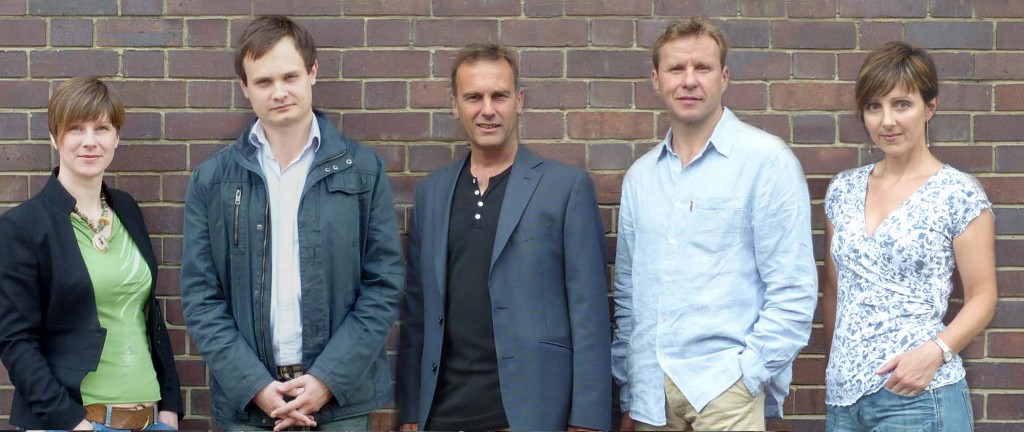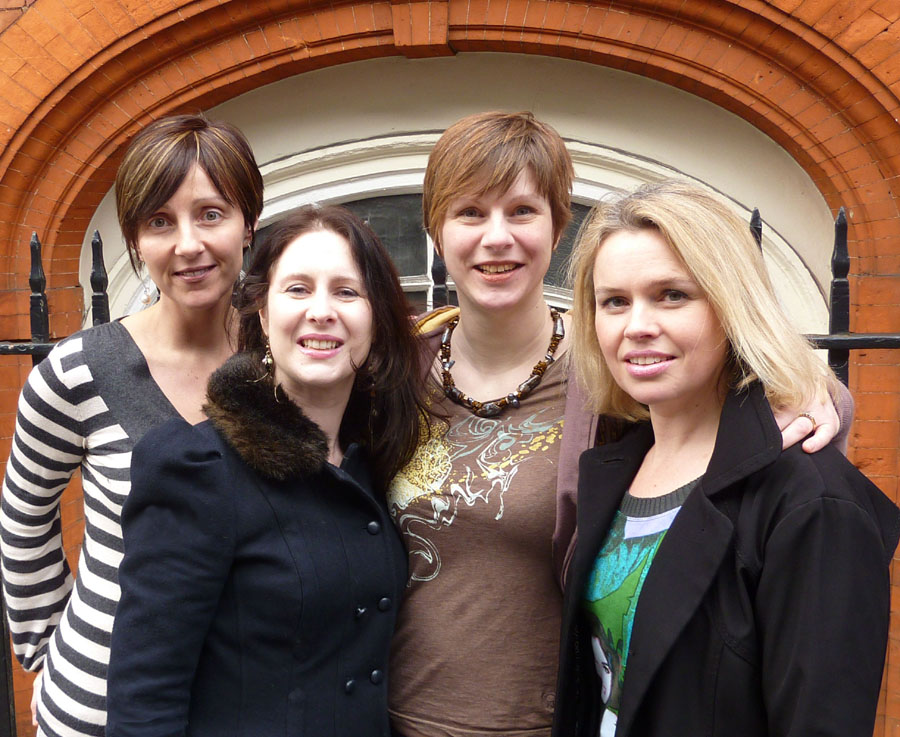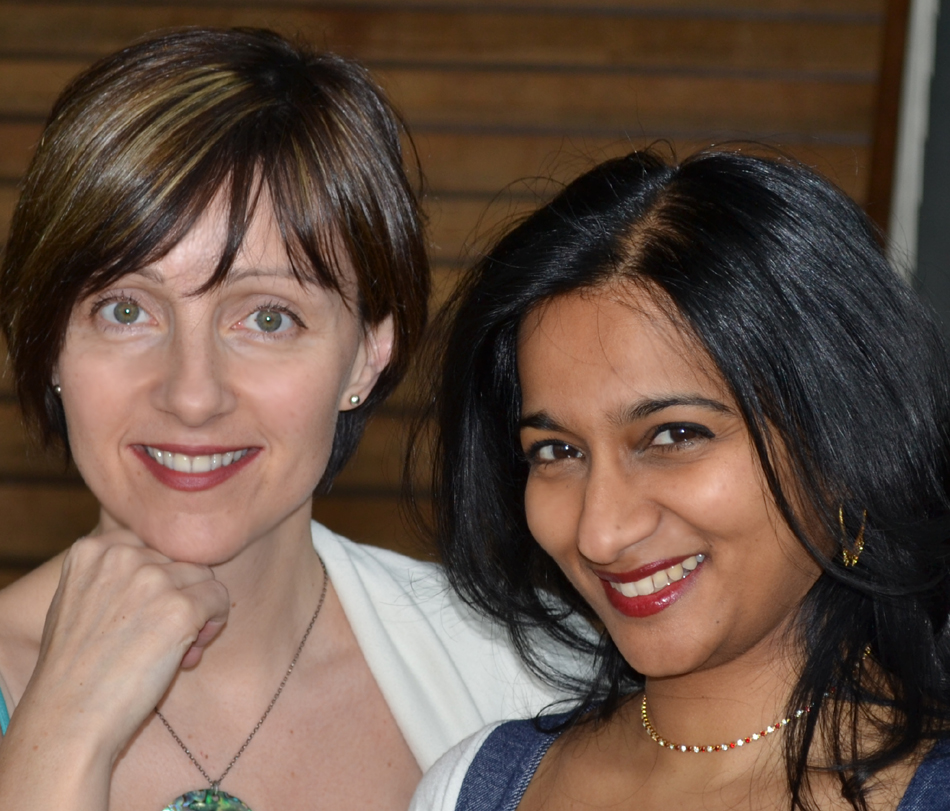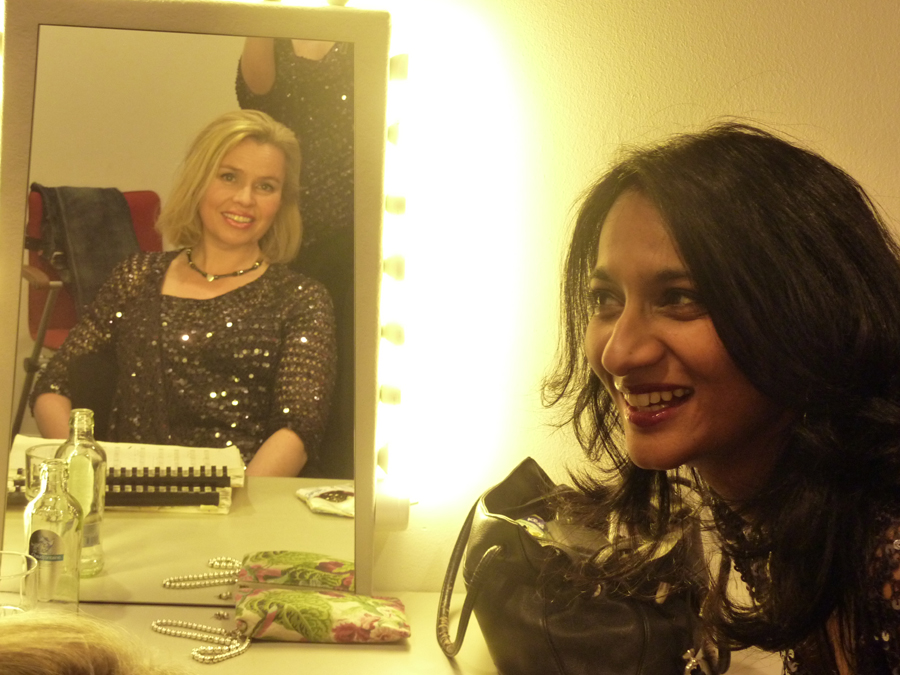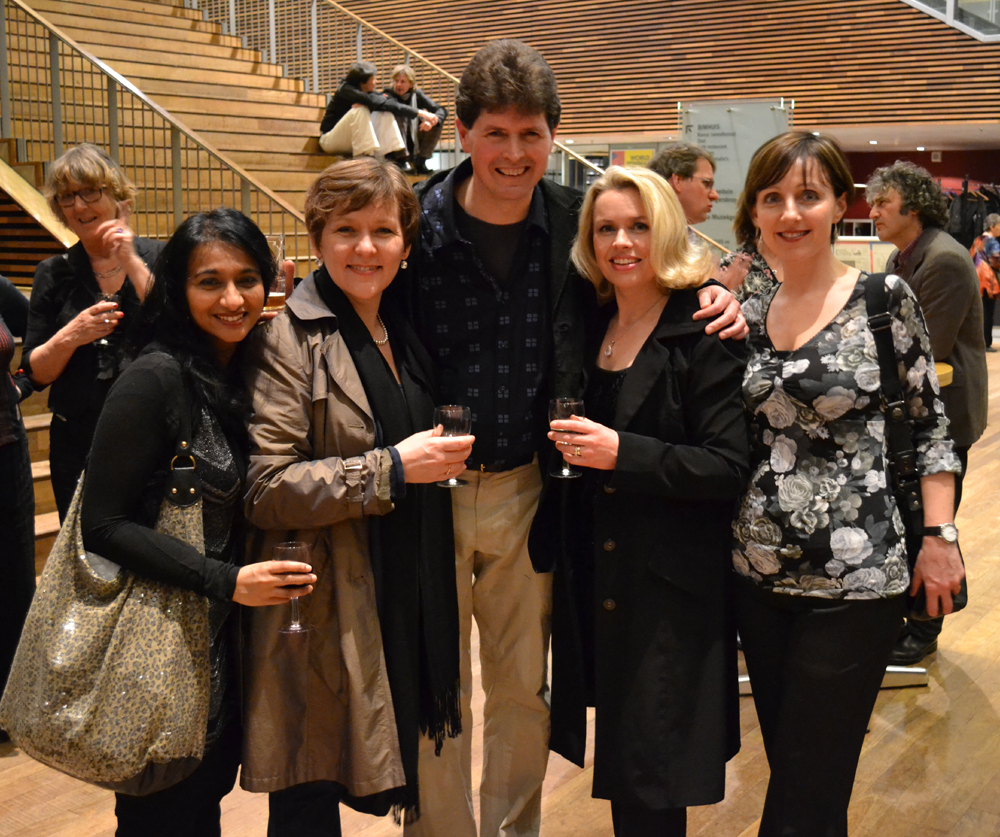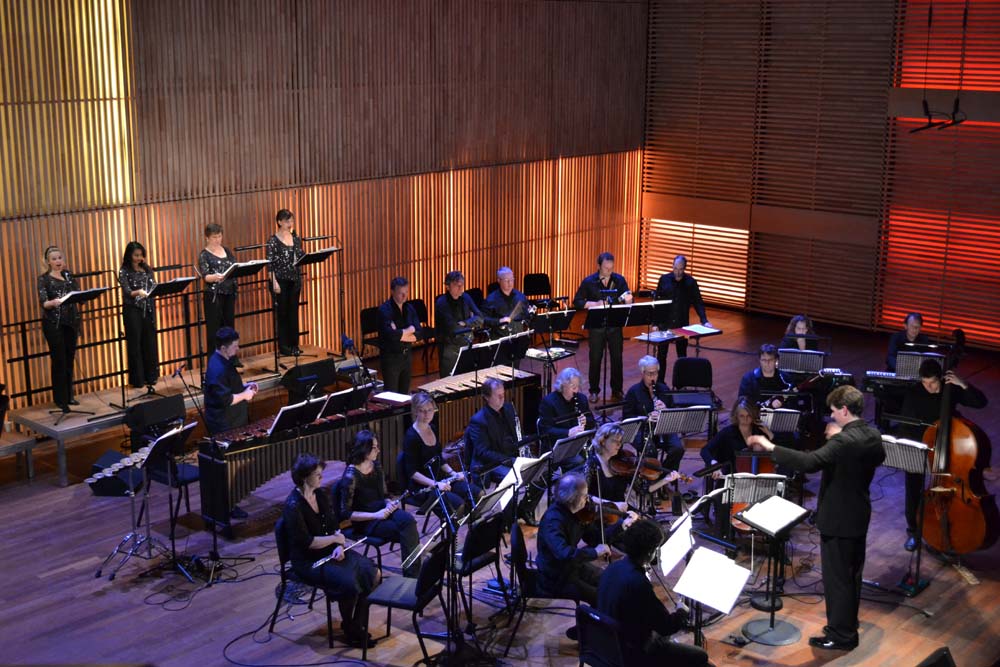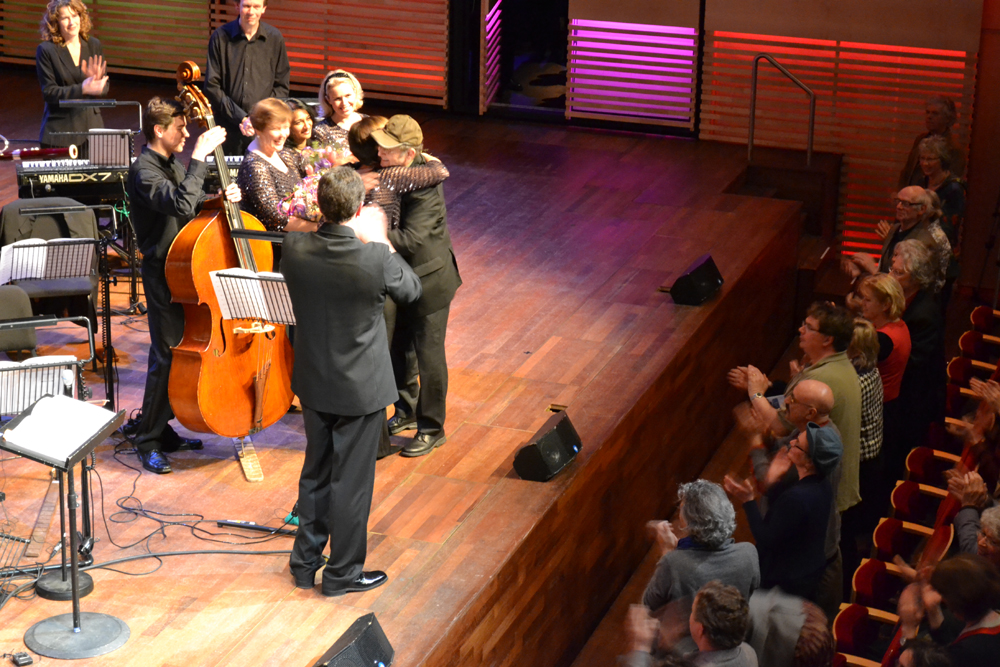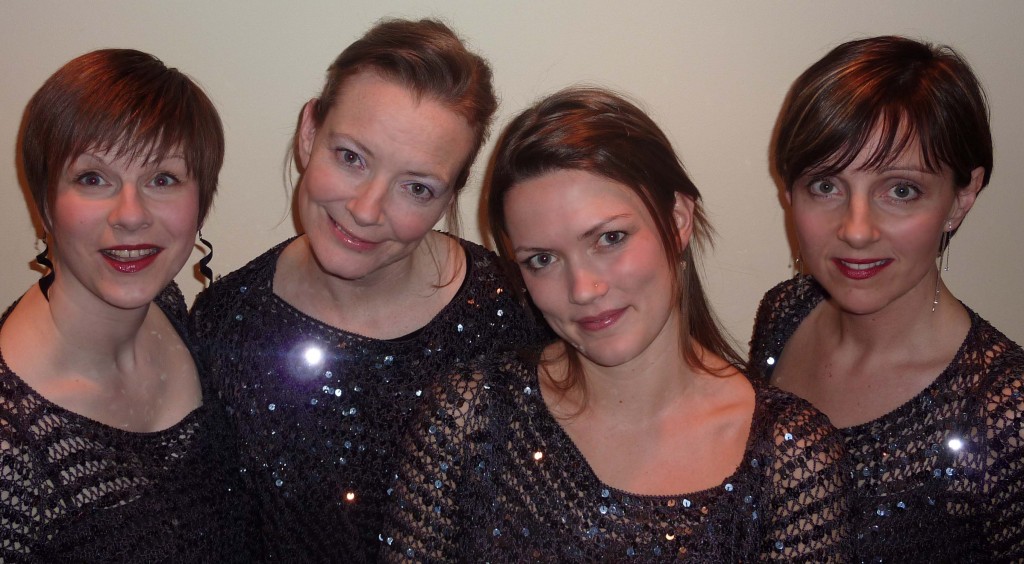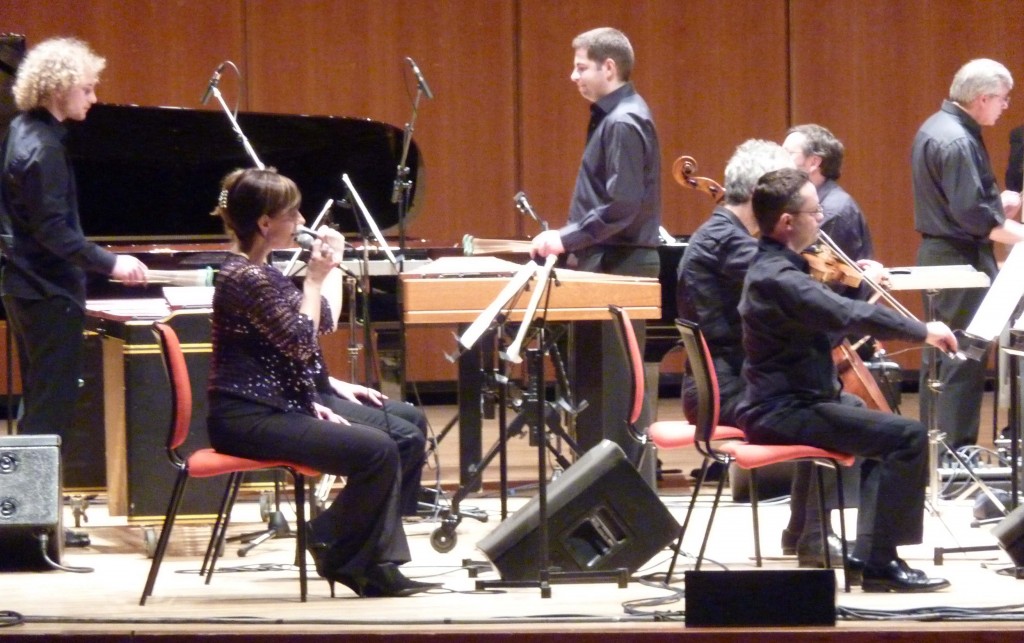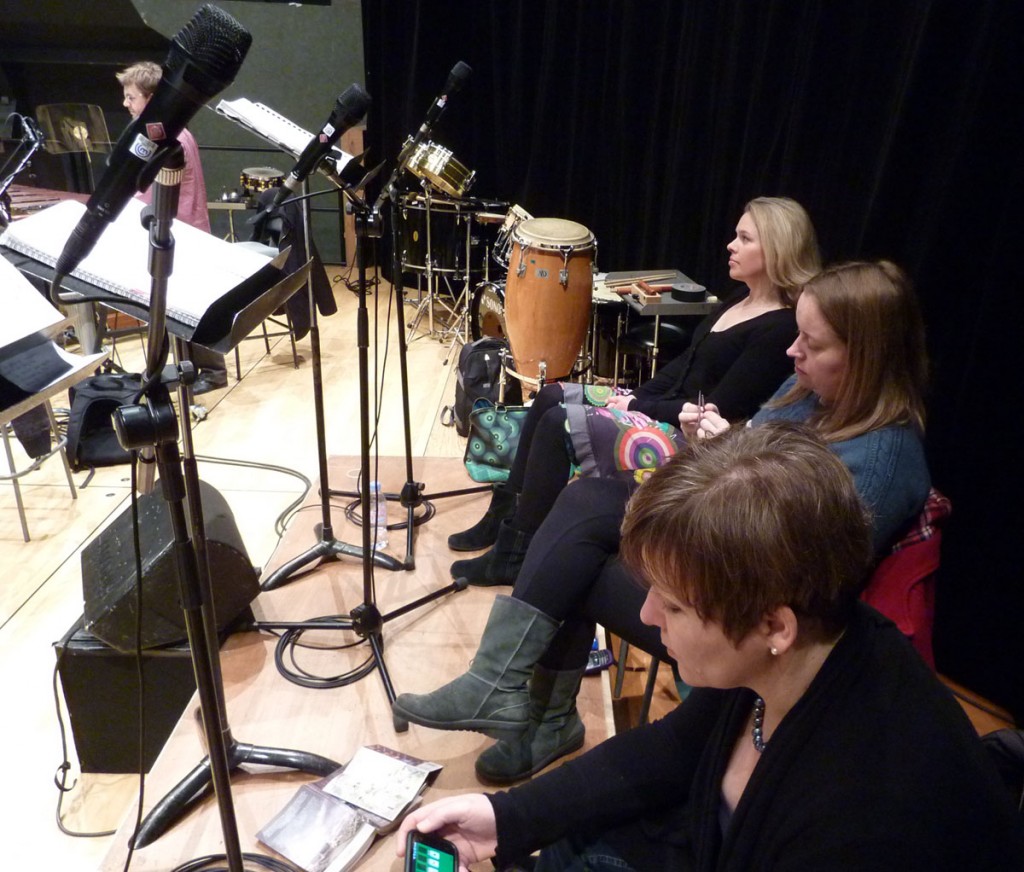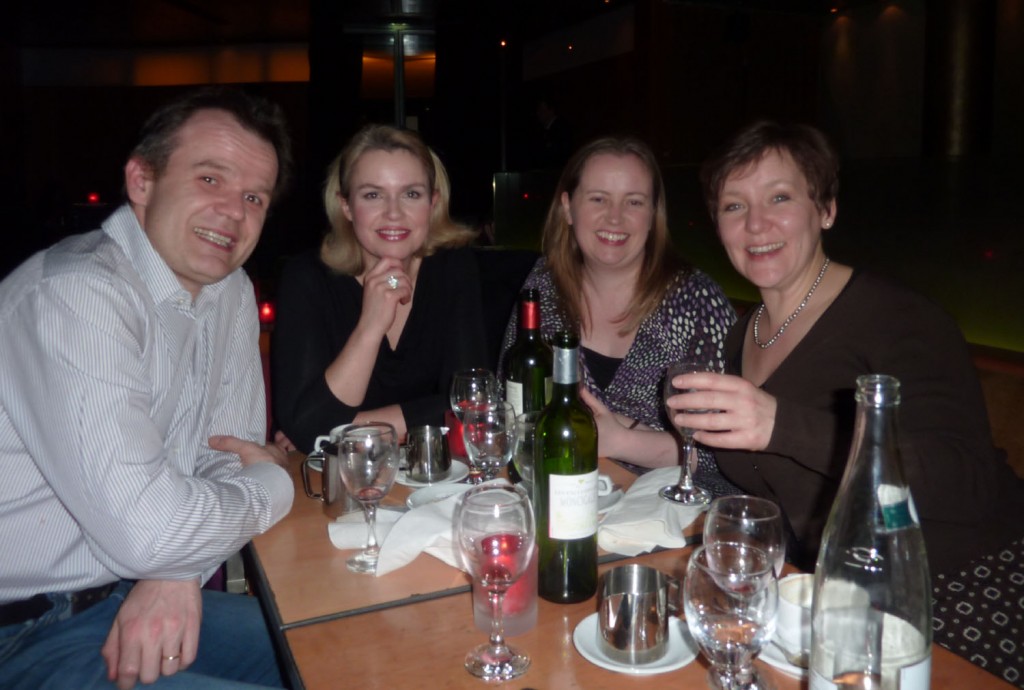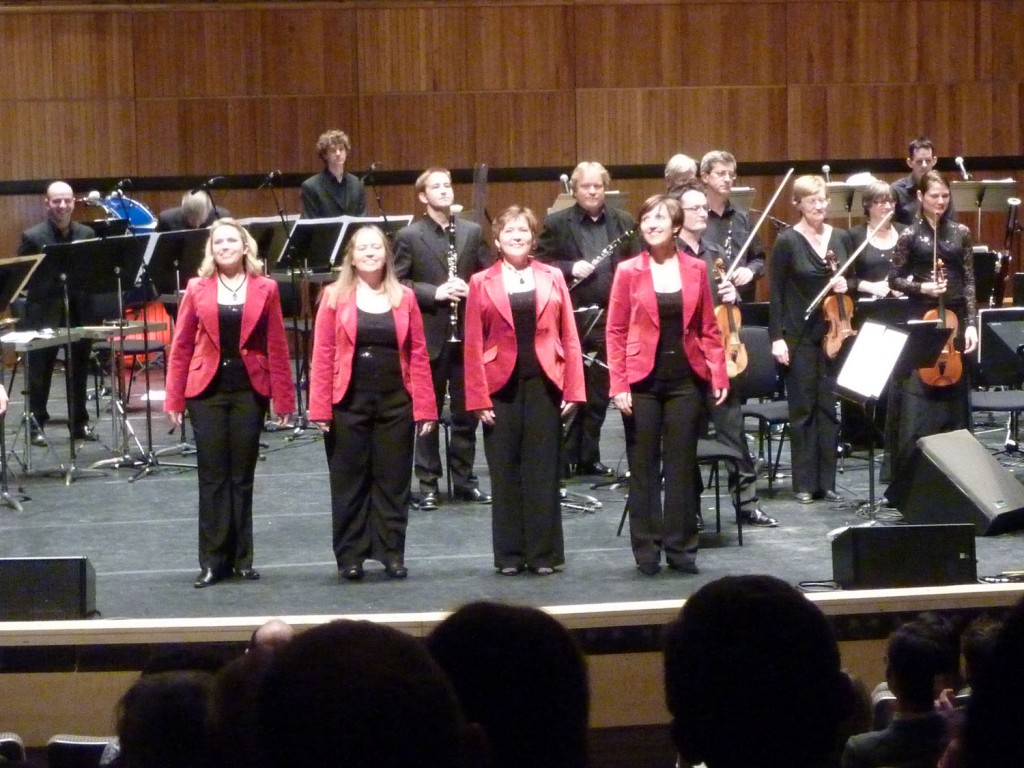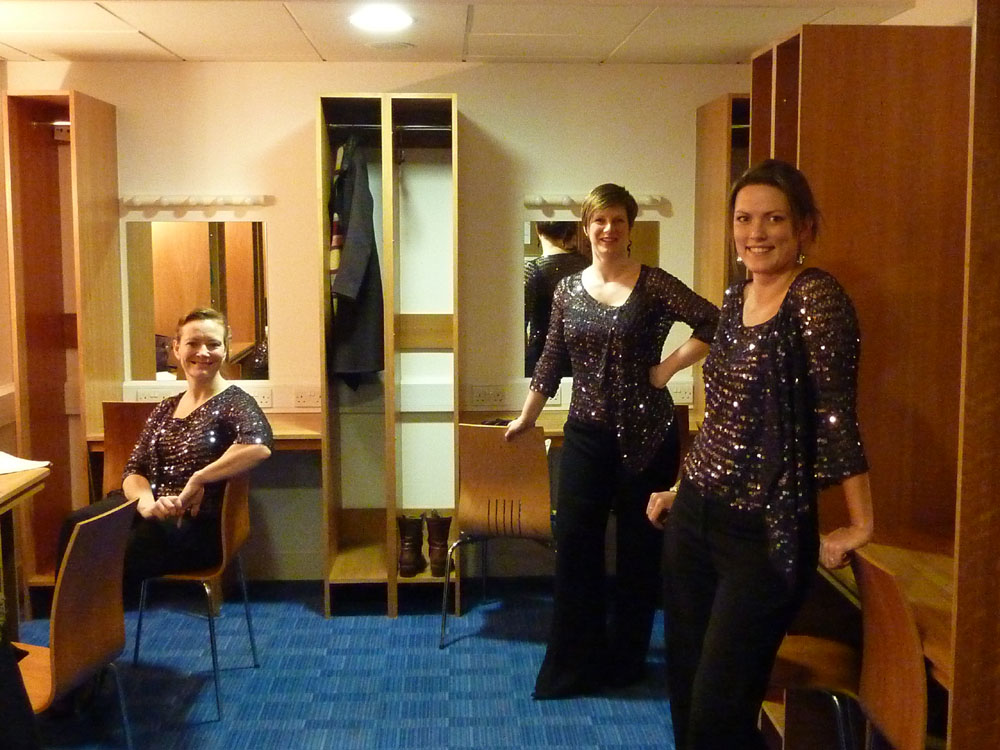Synergy represented by:
Amy Haworth, Micaela Haslam, Rachel Weston, Heather Cairncross
Andrew Busher, Gerard O’Beirne

Reich fest at the Konserthus
“Initially a solo voyage to Stockholm, I had three days to coach the ensemble (members of the Stockholm Philharmonic) for Music for 18 Musicians, then a couple of free days before the other singers arrived. It took me a while to get all the players’ names memorised (I’m hopeless at remembering names!), but we soon got to know each other as we worked our way through the piece together. Unfortunately, the publishers had sent an old edition of the score and parts, so my newer score was unusable. Music for 18 is unlike any other piece of music. It works on a cue system, without conductor, and the amount of time spent on any given section is largely down to the players. Stockholm Philharmonic had been sent a realised edition, with about 100 more “bars” than my modular score. Anyway, we perservered with the parts we had and managed to “unrealise” it as we went along – and correct all the mistakes (I think we’ll have a big bonfire this year and get rid of the old edition once and for all!).

Rehearsing in Grünewaldsalen
What an inspirational team of players this was. Writing this diary on the plane back to London (the concert was only two hours ago!), I am missing them all already. This was an incredible first performance of Music for 18. I hope the instrumentalists are all having many beers in the bar now because they throughly deserve a celebration! There are several really tricky sections in this piece, but we’d worked hard on ensemble, tempo and balance, to the point where I knew that if anything went wrong in performance, it would something totally unforeseeable.
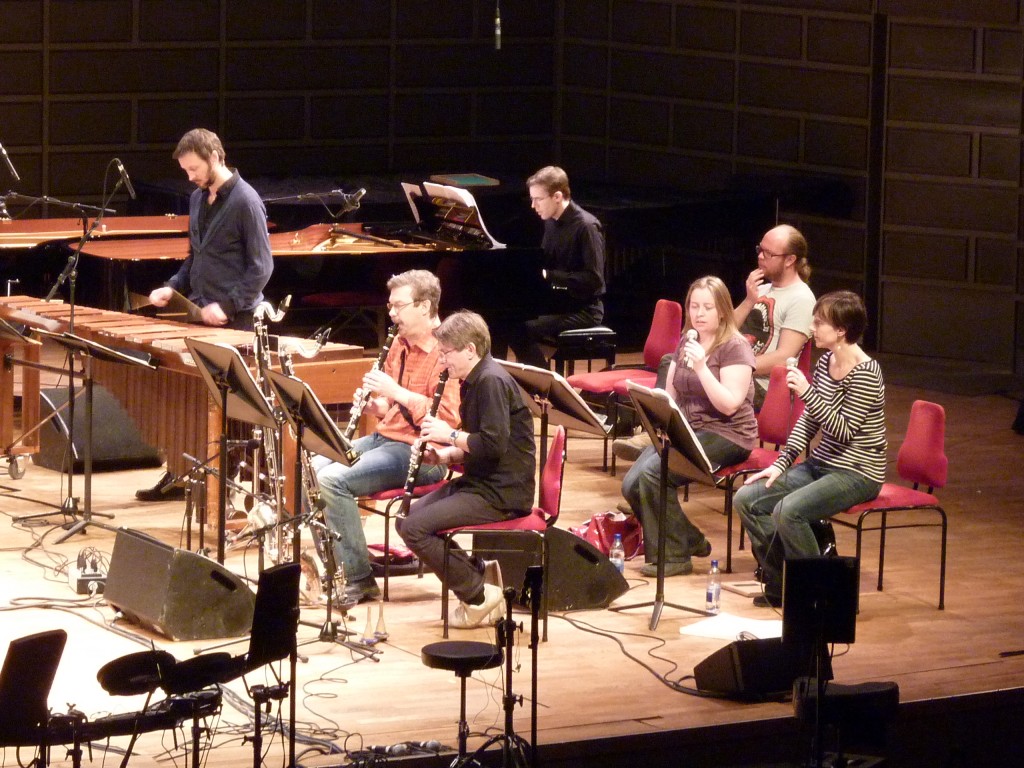
In rehearsal - stage left

In rehearsal - stage right
As long as Music for 18 is properly rehearsed and understood by all (as it was in this instance), a good performance is, to a great extent, down to the sound on stage (both acoustically and from the monitors). Each section is “led” by a different pattern. The players on the “pulses” have to stay in touch with this pattern, and the players at the front have to stay in touch with both. We were quite spread out on the Stockholm Konserthus stage, so our fate was largely down to the sound guys – Sound Intermedia. Fortunately, we couldn’t have been in safer hands.

Sound Intermedia backstage with Synergy Vocals
Apart from the other four concerts Sound Intermedia were engineering in this festival, this one involved setting up Music for 18 (including ten on-stage monitors) for the soundcheck, striking the stage, setting up for Sextet, then resetting the whole thing during the interval. Added to this, the concert day was the first opportunity we’d all had to play the piece in the hall. I know that Sound Intermedia have a digital desk, so they can preset levels, but believe me that isn’t always a guarantee that the sound will be the same in performance. Anyway, we can’t thank them enough. As soon as we started, I heaved a sigh of relief as I realised that everyone could hear what they needed to hear. The speed was great, Alf (clarinet) got the pacing just right, and they nailed all the tricky bits. I was so pleased for all concerned. Their success was richly deserved, and a sold-out Konserthus, a delighted composer, and a standing ovation provided the icing on the proverbial cake.
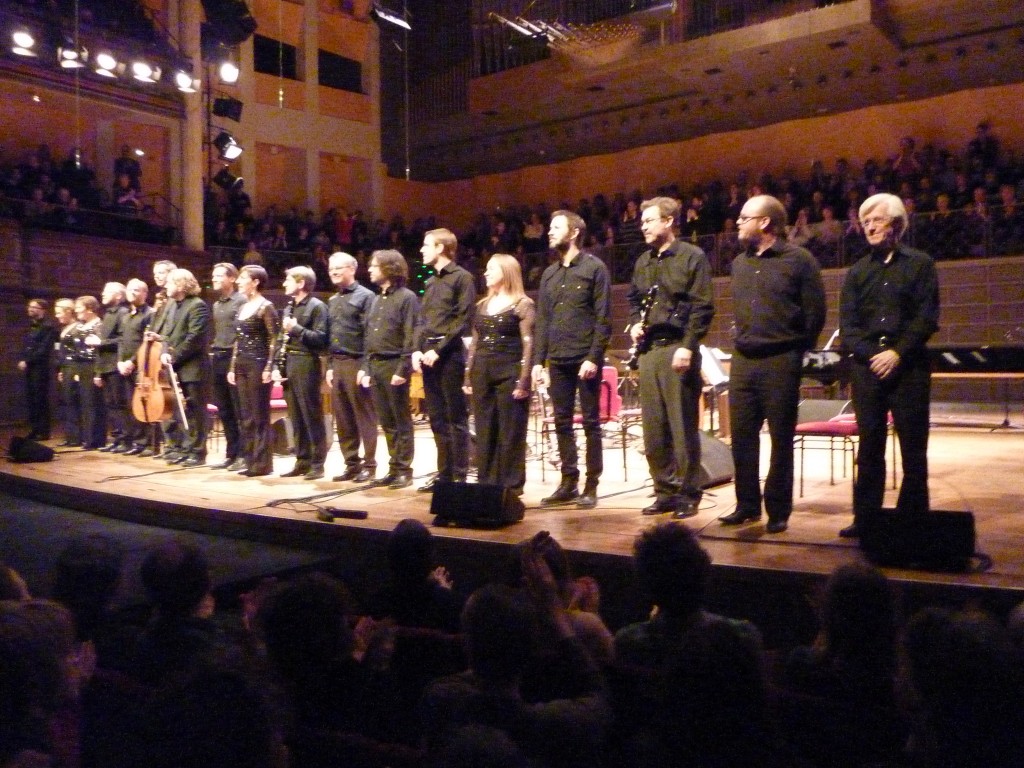
Bows after Music for 18
During the week, several people asked me how many times Synergy Vocals had performed Music for 18. I knew it was a lot but couldn’t remember, so I looked it up on the computer. This was our 75th performance of the piece – and the first performance of the piece in the year of Steve Reich’s 75th birthday. What were the chances of that? It’s hard to believe that Steve will be 75 this year. He looks amazing – in fact even better than he did at 70. We’re so privileged to work with him, and of course we’re hoping that he’ll live to be at least 105!

A chilly Stockholm

Stockholm in the snow
Going back through the week, our “middle” concert was Proverb. It’s such a beautiful, “simple”, Perotinesque piece, but blimey it’s a high-wire act! Extremely exposed and dead straight, with phrases that get longer and longer, it’s a recipe for larynx melt-down. Rachel had only sung the piece once a long time ago, and had had a nasty cough the previous week, but she did a great job. Heather sat in the audience and said that, unless she looked up, she often couldn’t tell who was singing what. The legend that is Andy Busher was brilliant on tenor 1, and he and Gerry are just the best tenor duet you could ask for. They sound great, they’re utterly reliable, and they scrub up quite nicely in concert dress too!

Proverb bows
Our first concert, and indeed the first concert of the festival, was You Are (Variations) and Tehillim. This is a big concert for any conductor – B. Tommy Andersson stepped up brilliantly to the plate. He declared (as others have declared before him) that conducting Tehillim is more difficult than conducting The Rite of Spring. I’m sure he’s right. One false move and the whole ensemble goes over the cliff! Once again, rehearsals were an absolute pleasure. Tommy was delightful, well-prepared, good-humoured and absolutely committed to giving the best performance we could possibly give.

High 5 for a great concert!
The performance almost didn’t happen at all, however. The concert was scheduled for 18.00 with a rehearsal from 10.00-13.00. We played through You Are (Variations) at 10.00, retired to our dressing room for coffee then all the lights went out. There was a major power cut due to a basement fire a few blocks away and a thick band of central Stockholm was completely without power. What to do? The management dealt brilliantly with the crisis, I have to say. Direct lines of communication were set up between the electricity board and Konserthus, and we were told that they hoped to have power back on at 14.30. A meeting was called for 15.00, flyers were printed saying that the concert was postponed / cancelled, and we discussed the possibility of rescheduling the concert over the weekend. Still no electricity at 15.00, so a final meeting was called for 16.00 – last chance to make an 18.00 concert possible – and on came the lights! We managed to rehearse Tehillim between 16.15 and 17.10, rushed off to get changed and made up, then headed straight back to the stage for the concert!
The players involved in this concert were quietly industrious and phenomenally talented. I still fail to understand how some percussionists can play Tehillim without a single triangle or a line written over the printed bars. From where I was standing, they seemed to be reading wall-paper. I like to think I’m pretty good at rhythm, but I’m sure that my brain would melt down after about 16 bars of one of those clapping or drumming parts.

... and there it goes!

Ice heading for the weir
Music aside, Stockholm was (as to be expected in January) extremely cold. Check out the chunks of ice in the river. I was mesmerised by the ice pushing its way under the bridge and rushing down the weir on the other side. It was like playing iceberg Pooh-sticks!
We were busy with rehearsals on most days, but managed a group outing to the incredible Vasa Museum. I’m so glad that I knew nothing about this glorious ship before entering the museum – you get such a “wow factor”. It’s the most remarkable salvage project you’re ever likely to encounter. If you go to Stockholm, don’t miss it. It’s hard to believe that 95% of this ship (which sank after sailing less than one nautical mile on her maiden voyage in 1628), is original. You could be forgiven for thinking it was a film set for Pirates of the Caribbean.
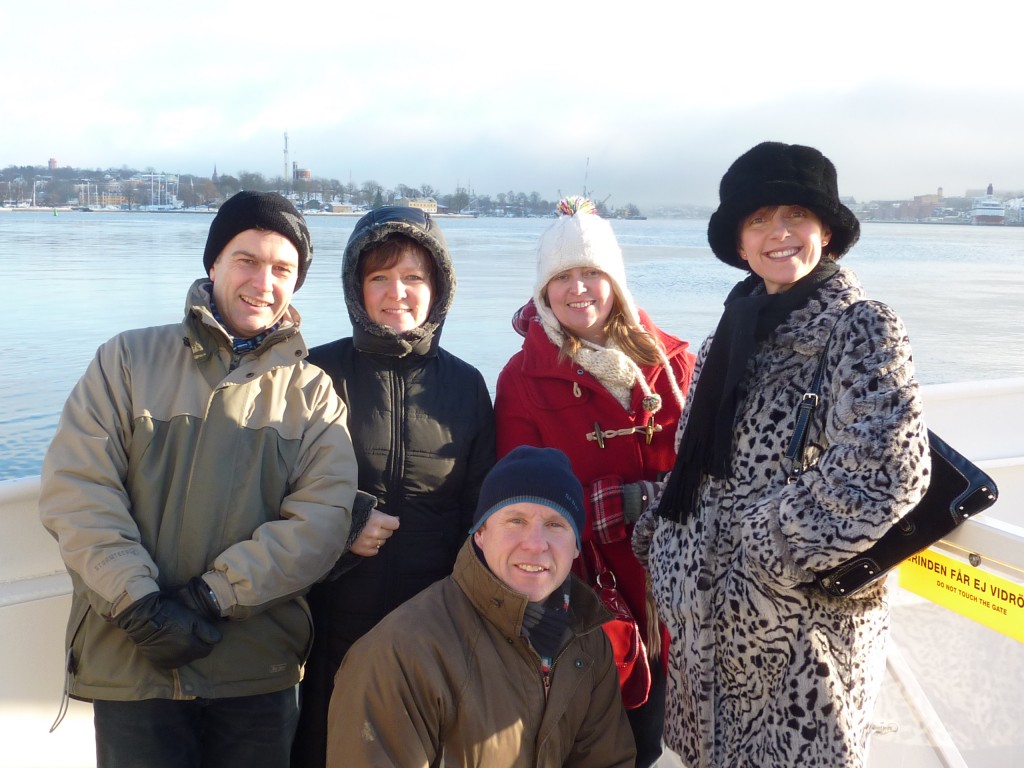
Group outing to Vasa (L-R: Gerry, Heather, Andy, Amy, Micaela)

The Vasa
Apart from the Vasa Museum, I managed to enjoy a couple of days staying with my partner Will at the apartment of my good friend Kimberley Akester (another ex-Swingle) who now lives in Stockholm and runs SITS (Stockholm International Theatre School). It was a bit chilly for aimless wandering, but we managed several trips to Wayne’s coffee shop in the market square which, apart from a very good mocha, offered a fine view of our musical home for the week – the Konserthus.

View of Konserthus from Wayne's Coffee!
Huge thanks to everyone at Konserthus for looking after us so well. We really do appreciate all the lengths you went to to make us feel as comfortable and welcome as possible (though we’re not entirely convinced about your choice of hotels…). We’re absolutely thrilled that plans are already afoot to work together again, and we look forward to our next visit already.”
Micaela



